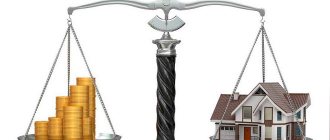In what cases will you need the help of an independent appraiser? What is the cadastral value of real estate, how does it differ from the market value? How to find the “golden mean” if the seller and buyer differ in their assessment of the same product? How to choose the right appraiser if necessary?
Answers to many assessment questions can be found in the new issue of the Rossiyskaya Gazeta Library. The collection is called: “Property valuation: everything the owner needs to know.” It was prepared by specialists from the VETA expert group, who wrote even the most “confusing” things in simple and accessible language, accompanied by examples from life.
What is market value?
The market value of an appraisal object is understood as the most probable price at which this object can be alienated (sold) on the open market under competitive conditions. This implies that the parties to the transaction act reasonably, have all the necessary information, and the value of the transaction price is not affected by any exceptional circumstances.
You must understand that the market value always depends on the relationship between supply and demand in the market, and therefore does not always correlate with the cost. For example, when the real estate market is growing rapidly, the market price per square meter can be much higher than the actual costs incurred by the developer, because demand is high and the apartment will be bought anyway. In crisis conditions, on the contrary, sellers are forced to offer real estate with a minimum markup to cost, but if there is no demand, the market price can fall very significantly.
Selecting a method and conducting an assessment.
There are several assessment methods:
- Costly method. It is based on accounting for the expenses incurred by the company. Demonstrative, detailed method.
- By asset value. All assets of the enterprise are summed up. Often chosen by owners of large manufacturing enterprises, as well as property owners.
- By competitors. When there is not much information to evaluate your own activities, you can make a comparative analysis based on information about similar companies on the market.
- Based on cash flow forecast. Long-term prospects are studied, return on investment and payback periods are calculated.
Each method has its own advantages and disadvantages. The choice in favor of one of the listed options depends on the specific situation and goals of the assessment.
- Risk assessment. All existing risks that threaten your business are analyzed.
- Opportunity analysis. Identifies the company's development prospects.
- Formulation of results.
The final report will collect all the final information, draw conclusions and determine the value of the enterprise. This analytical work is certified by lawyers of the appraiser company and has an official status.
You can sign up for a free consultation on assessing your business by phone or on the website.
When is a market value assessment necessary?
The most common cases:
- to conclude a purchase and sale transaction;
- for lending against collateral (including for obtaining a mortgage loan);
- to challenge an inflated cadastral value, when the market price is recognized as such (this is necessary for the correct calculation of the amount of property tax);
- when dividing and transferring property during divorce, receiving an inheritance, registering a deed of gift, etc.;
- when seizing property for the needs of the state - federal, regional structures and municipalities.
In addition, there are other, less common cases, for example, determining the market value of securities, antiques, and other valuables.
There is only one rule: everything that can be bought or sold can be assessed to establish market value.
Real estate valuation for inheritance
Determining the value of real estate upon inheritance is necessary in order to correctly calculate the amount of state duty to pay for notary services. Its actual price depends on the cost of the object.
The market value of the object transferred by inheritance is taken into account.
If the assessment is not carried out, the property cannot be transferred to the heir. Registration authorities and notaries do not legalize the transfer of property rights without this procedure. It is very important to complete the assessment on time and to enlist competent specialists in this field.
The state fee is the only mandatory payment charged for the performance of procedural actions by a notary. The amount of payment is established at the legislative level by calculating a percentage of the assessment amount. Therefore, the amount of the duty is interconnected with the assessment of the object.
The main rule for valuing an object inherited is to determine the current value at the time of the death of the testator. Therefore, it is important to carry out the procedure as quickly as possible.
If several objects are inherited, the assessment is carried out separately for each.
The value of the property indicated in the assessment will serve as the basis for dividing the inheritance between legal successors, if there are several of them and their shares have not been determined in advance.
In 2021, property assessments made by independent experts often began to be challenged. If the heir believes that the cadastral value is not equivalent to the market value, he can contact a commercial company to determine the real value of the object.
What is “true” and “reasonable” value?
Documents often use terms not provided for by law: “true value”, “reasonable value”, “equivalent value”, “real value”. In Art. 7 of the Law on Valuation Activities establishes that if a specific type of value is not defined in an evaluation agreement or a regulatory legal act introducing the evaluation of an object, then the market value of this object is determined. The same rule applies in the case of using in documents terms more often used in colloquial speech: “reasonable”, “real”, “actual” cost, etc. That is, in all such cases, the determination of the market value of the object is implied.
Documents for real estate valuation
To determine the value of real estate you will need the following basic package of documents:
- Owners' passports - if they include minor children, birth certificates (for children under 14 years old) or passports (for children over 14 years old) are also provided.
- Documentation securing the right to the object - registered certificates of ownership if the following grounds exist:
- purchase and sale agreements;
- entry into inheritance;
- deed of gift;
- rental agreements.
- Technical documentation - technical passport from BTI . This document should be ordered in advance, as its production requires a certain time. Also, along with the technical passport, a building plan with an explanation of the floor plan is provided, which records the following characteristics:
- square;
- number of storeys;
- appointment;
- date of commissioning;
- layout;
- wall material, ceiling height;
- wear percentage.
- certificate of state registration of rights or a document on the basis of which it can be carried out;
- passport or equivalent document;
- passport of the apartment owner (if the customer and the owner are different persons);
- extract from the technical passport (from the BTI) - floor plan with explication;
- description of encumbrances.
Documents for appraising an apartment:
If the apartment is an object of common shared value of several owners, documents are provided for each of the owners.
Apartment Valuation Certificate
The act establishes the real cost of housing. It is compiled by a professional appraiser who has a certificate and permission to carry out appraisal activities. The report is drawn up on a standard form and sealed with the seal of the organization that carried out the assessment.
Documents for home assessment
The following are added to the main list of documentation:
- cadastral plan;
- floor plan with explication (characteristics, area, layout).
What is investment and liquidation value?
Investment value, in contrast to market value, is determined primarily by the benefit that the owner can derive from using the property. It is believed that this is the highest amount that the buyer is willing to pay. Individuals rarely order investment value determination; more often, business representatives and government agencies act as customers.
As for the liquidation value, this is the most likely price at which the property can be sold in a short time, insufficient to attract a wide range of buyers.
When do you need to know the salvage value?
The sale of various properties at liquidation value is rarely voluntary. As a rule, such a sale is a forced action of the owner associated with negative circumstances in his life.
Citizens are faced with this need when, for some reason, they are forced to quickly “get rid” of their property. For example, a person is unable to repay a loan, has fallen into arrears and is ready to sell the collateral in order to return the money received to the bank and close the debt. The bank, in turn, demands to sell the collateral at its liquidation value as soon as possible.
How much does a property valuation cost?
The cost of appraiser services is determined on an individual basis. When signing a contract with an appraiser, you should not ask him to name the price for services in advance. He won't be able to do this.
It will take time to analyze the object according to a wide list of criteria, which determine the final price.
Basically, the cost of an appraiser’s services is related to the availability of a number of documents, deadlines and scope of work. The price of a specialist’s services is not related to the cost of the object in any way.
What is cadastral value?
This indicator is fundamentally different from any other type of property. According to the Federal Valuation Standard “Determination of the cadastral value of real estate (FSO N 4)”, the cadastral value of a real estate property is determined on the basis of market information related to the economic characteristics of the use of the real estate property. It is important that the cadastral value is determined both for objects present on the open market and for objects for which the market is limited or absent. All real estate objects, information about which is contained in the state real estate cadastre, are subject to such an assessment. Therefore, the cadastral assessment is of a total nature.
If previously the cadastral value was used for taxation of legal entities and - as an experiment - individuals (citizens) only in a few regions, then since 2015 this procedure has been extended to the entire country.
Now the distribution of land tax and real estate tax bills for individuals has just begun, and for the first time these taxes are calculated based on the cadastral value.
Real estate valuation
Professional expert assessment of the value of real estate is a fairly common service today, without which a number of trade (and sometimes non-trade) transactions related to housing and other types of real estate cannot be done. In other words, practically no real estate transaction is possible without independent monetary valuation. Moreover, it is the professionalism in conducting such a financial examination and the calculation of the most accurate real value of a structure or land plot that largely determines its market value. Indeed, the purchase and sale of an apartment, building or other real estate almost never occurs “at random”, because without knowledge of the real cost of housing or land in a particular region, carrying out such trade transactions today is not possible. In addition, the need for monetary valuation is also due to the fact that housing and land prices are quite high today, and the real estate market itself is currently quite unstable. Based on all that has been said, it becomes clear that an independent expert assessment of real estate when buying, selling or other types of alienation is not a whim, but a real necessity. In what cases do they resort to monetary valuation of real estate? As already mentioned, independent financial expertise, which makes it possible to determine the real value of a residential or non-residential property, as well as land, is used in all types of trading transactions related to such property. In particular, the services of expert appraisers are resorted to in the following cases: - purchase and sale or any other forms of alienation of real estate; — use of residential and non-residential properties as collateral (collateral) when obtaining bank and non-bank loans; — assignment of debt obligations on property; - transfer of housing or land for rent, as well as in the so-called trust management; — use of buildings, land plots and other forms of real estate as a contribution to authorized capital; — liquidation (demolition) of real estate; — insurance of an apartment or other objects; — implementation of investment projects involving residential, non-residential and land properties; - execution of inheritance rights, judicial resolution of various types of property disputes In addition, there are a number of other cases when there is a need to conduct an independent assessment of the value of real estate, both state and privately owned. What types of property are subject to valuation? Despite the fact that the very concept of “real estate” is quite broad, when talking about monetary value, we usually mean three main types of such property - buildings, structures, and land. The most common practice in this case is traditionally the calculation of the real cost of a residential apartment or private residential building when buying, selling or leasing them, as well as assessing the value of industrial buildings and structures (the latter include all kinds of industrial and commercial facilities that can be part of the property of an organization or enterprise that requires an independent financial examination of the value of real estate). As for land plots, individual housing construction (individual housing construction) lands, garden plots, industrial and agricultural lands, forest lands, etc. are usually subject to expert monetary valuation. Basic approaches to monetary valuation and methods for valuing real estate When it comes to monetary valuation of any type of property, various types of value can be taken into account. If we talk specifically about real estate, then there are market, investment, cadastral, and liquidation values. In addition, sometimes we can talk about insurance and consumer costs; the value of socially significant real estate objects or the value of an enterprise in relation to the assessment of individual buildings or structures. Most often we have to deal with the market value of real estate buildings and structures, which, in fact, represents the most realistic purchase and sale price of such an object on the open real estate market at the time of the assessment. In professional valuation activities today, three main approaches are used - profitable, costly, and comparative. Based on the chosen approach, a certain methodology is used, according to which experts subsequently conduct an independent assessment of the market or any other value of an apartment, industrial building, plot of land, etc. I would like to draw attention to the fact that any nuances of each assessment methodology (and there are currently there are several points) in this case are regulated by the established regulatory and legislative framework, and it is for this reason that only professional expert specialists with the proper knowledge and experience, as well as having the appropriate license to conduct valuation work, can carry out monetary valuations. How the value of real estate is assessed Most often, such a service includes a whole range of works, and its composition will depend primarily on what, how and for what purposes is being assessed. In this case, the expert takes into account a number of points: the type of real estate (apartment, house, industrial building, plot), the purpose of its monetary valuation (sale, collateral, assignment of obligations, general business valuation, etc.), features and market conditions real estate in a given region and at a given point in time. Also, the features of such an independent expert assessment will largely depend on what type of ownership the property is in - private or state property. In most cases, this process includes the following stages: - a clear definition of the goals and objectives that such work sets for itself; — preliminary inspection of the real estate being assessed; — drawing up an agreement on the provision of expert assessment services; — collection of primary data, as well as their detailed analysis; — determination by an expert of optimal approaches and methods that will be used when calculating the cost of housing, land or an industrial building/structure; — assessment of property rights (in the case of a monetary assessment of the value of land plots, there is also an assessment of improvements on the site); - when using various assessment methods - comparison of the results obtained; — drawing up a report on the results of the work performed, as well as issuing an independent expert opinion on the cost of the object. The main result of the assessment of any real estate is the provided documentary report, which contains all the necessary information about this property, its estimated value, as well as the methods, approaches and other means that were used in the work of the expert appraiser.
Is it possible to challenge the cadastral value?
The cadastral value was calculated in stages; in most cases, mass valuation methods were used, that is, similar objects with approximately the same characteristics were grouped for valuation using mathematical modeling methods. But with this calculation procedure, many errors arise. For example, the cost of some land plots turned out to be 4-10 times higher than the market value.
Therefore, the law provides for a procedure for challenging the cadastral value and establishing its real market value in relation to the object. This assessment is carried out by independent appraisers.
By the way









